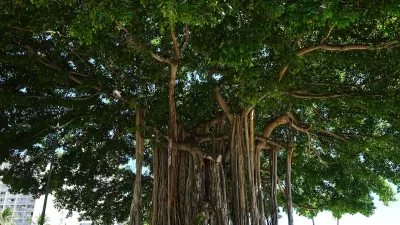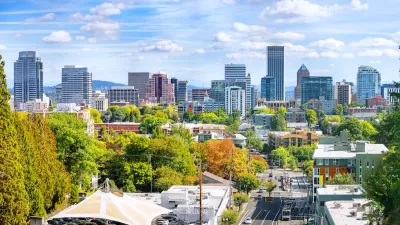A tiny insect, native to Asia, has been killing trees in huge numbers around the United States since 2002. With the emerald ash borer expected to spread, cities are trying to prepare to combat the worst of the devastation.
"An exotic pest that has damaged trees in Boulder is expected to spread to metro Denver and could cost millions of dollars in dead and dying trees," reports Elizabeth Hernandez.
The news about the emerald ash borer, which originates from Asia, comes via a report released by the Colorado State Forest Service. According to the report, " The potential economic impacts of (emerald ash borer) in the metro Denver area alone could be as high as $82 million, based on a loss of annual services provided by the canopy cover, and not including potential costs for ash tree removal, treatment and replacement…"
An earlier report by Susan Clotfelter described the devastating impacts of the emerald ash borer in Boulder back in 2013. Planetizen has noted the emerald ash borer's prominence in a planning story from Louisville and a story from 2002 in Ann Arbor, when the insect was first found in the United States.
The emerald ash borer is also making trouble in Bozeman, Montana, where the city commission recently approved a plan to prepare for the "inevitable arrival of the invasive emerald ash borer…" Eric Dietrich reports these details on the plan in Bozeman:
Among other provisions, it calls for expanding the city’s four-member forestry department, adding the equivalent of three employees to increase pruning frequency, complete an inventory of tree locations and proactively prepare for the ash borer’s arrival. Those actions will require a 26 percent increase to the Bozeman Forestry Division's annual budget. The ash trees targeted by the insects "constitute about 80 percent of Bozeman trees in the downtown area and half the urban forest citywide."
In addition to the high costs incurred by the devastation caused by the emerald ash borer, they are also likely to cause physiological effects on humans as well. A recent study concluded: "Women living in a county infested with the emerald ash borer had a 25 percent increased risk of cardiovascular disease."
FULL STORY: Emerald ash borer could cause $82 million impact in metro Denver, report says

Maui's Vacation Rental Debate Turns Ugly
Verbal attacks, misinformation campaigns and fistfights plague a high-stakes debate to convert thousands of vacation rentals into long-term housing.

Planetizen Federal Action Tracker
A weekly monitor of how Trump’s orders and actions are impacting planners and planning in America.

Chicago’s Ghost Rails
Just beneath the surface of the modern city lie the remnants of its expansive early 20th-century streetcar system.

Bend, Oregon Zoning Reforms Prioritize Small-Scale Housing
The city altered its zoning code to allow multi-family housing and eliminated parking mandates citywide.

Amtrak Cutting Jobs, Funding to High-Speed Rail
The agency plans to cut 10 percent of its workforce and has confirmed it will not fund new high-speed rail projects.

LA Denies Basic Services to Unhoused Residents
The city has repeatedly failed to respond to requests for trash pickup at encampment sites, and eliminated a program that provided mobile showers and toilets.
Urban Design for Planners 1: Software Tools
This six-course series explores essential urban design concepts using open source software and equips planners with the tools they need to participate fully in the urban design process.
Planning for Universal Design
Learn the tools for implementing Universal Design in planning regulations.
planning NEXT
Appalachian Highlands Housing Partners
Mpact (founded as Rail~Volution)
City of Camden Redevelopment Agency
City of Astoria
City of Portland
City of Laramie




























